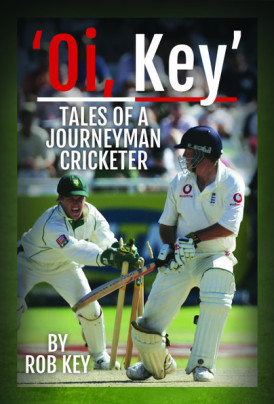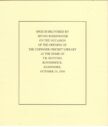‘Oi, Key’
Martin Chandler |Published: 2020
Pages: 190
Author: Key, Rob
Publisher: White Owl
Rating: 4 stars

In his playing days I always did like Rob Key, for a number of reasons. Firstly, and in some ways most importantly, I have always had a high regard for cricketers who succeed despite being built for comfort rather than speed. In my youth there were a good few of them around. Nowadays they are a rarity, but men like Key, Samit Patel and the great Inzi have always been personal favourites.
It helped of course that Key was a good batsman. By suggesting in his foreword that Key could have been a hundred Test man I fear his great friend Andrew Flintoff is probably overplaying his hand a little, but not by too much and Key’s sub title, Tales of a Journeyman Cricketer, is certainly inappropriate. I recall a batsman who seemed not to enjoy a great deal of luck at the highest level but who could certainly on occasion look as imperious at the crease as anyone.
Key also helped himself in my eyes with what what always appeared to be a relaxed demeanour and, unlike some sportsmen, when he spoke he was clearly articulate and entertaining, and it seemed to be universally accepted within the game that, as he led Kent for a decade, he was an astute captain.
The above said the other side of the coin is that being a top bloke and a decent cricketer are not factors that, without more, mean that a man has a book in him. In terms of achievement a solitary double century and an average of 31.00 over a fifteen match Test career is not the stuff of legend, nor is an overall career average of forty, a captaincy record that brought just one trophy (the 2007 Twenty20 Cup) or restricting his appearances in the newspapers to the back pages.
Despite everything however I never had any doubt but that Key’s book would be other than a very good one. Part of the reason was my already stated fondness for the man himself, whose stock has risen considerably by virtue of his work as a Sky commentator, and the other major factor was his choice of ghost writer, John Woodhouse. Not the most visible of ghosts by any means Woodhouse has already proved himself as one of the best wordsmiths around with his involvement in both of Graeme ‘Foxy’ Fowler’s recent books, and that of Steve Harmison.
Perhaps the first point to be made about Oi, Key is that it is not an autobiography as such. There is no neat chronological path taken through Key’s life, and indeed throughout the book he dwells at much greater length on others than on himself although Key does still give his reader a good deal of himself in the stories that he tells.
A recurring subject in Oi, Key is that of coaches and coaching. His involvement with Kent and England at so many levels means that Key has come into contact with many coaches, some well known and others whose names are less than familiar. His theory that Duncan Fletcher did not want to play him with Flintoff and Harmison together is an interesting one, although the wealth of stories that arise out of the closeness of the bonds between the three of them makes it increasingly credible as the book unfolds.
On the subject of coaching one of Key’s attitude is one which does him great credit in my eyes and is certainly one that I can identify with. I think everyone recognises that coaching, or training, is vitally important in all walks of life and Key is no different. What he has no time for, and neither do I, is some of the weirder and wackier concepts, particularly in the field of ‘team building’ that have gained traction in recent years – why can’t managers just let us get on with our jobs?
Some men get their own essay in the book, and the relevant chapter titles make it obvious who the subjects are; Fred, Nasser, Warney and Murali are four. Less obvious is The Red Handkerchief, which is about Steve Waugh. There is no separate chapter on Harmy, but he seems to crop up in all the others, so his important role in Key’s thoughts is fully presented.
There is a perceptive chapter on Captaincy, which isn’t a tactical analysis but a look at the differing approaches to the job. Unsurprisingly Messrs Hussain and Vaughan in particular come out of that one well, but overall it is a fascinating guide, particularly for those of us who have never had the job of leading a cricket team.
Also of interest is Serve and Volley, a look at the art of sledging, which is rather more than a collection of amusing stories, although there are certainly a few of those. The chapter on Perspective, clearly an important aspect of what makes Key tick, is a thought provoking one.
Unsurprisingly in light of the view he takes of himself, confirmed in the sub title, Key takes a critical look at the way cricket is run in England and at the lot of the county cricketer. For those of us who are utterly devoted to the concept of the County Championship it is reassuring to learn the value that the players of Key’s generation place on it. Rather less positive is reading about Key’s concerns for the future of the First Class game as we know it although, sadly, he must be right.
Key winds up his book with Blue Sky Thinking, a chapter dealing with his new career in the Sky commentary team and his thoughts on his colleagues there. Unsurprisingly none of the Sky team will be offended by anything Key writes, although that does not detract from an interesting account. Key’s approach to what he does in the pod/box is again an interesting one and underlines the message that comes out time and again in ‘Oi, Key’, that being that its author really doesn’t rate himself anything like as highly as he should.
The book is published by White Owl, part of the Pen & Sword group and is a well produced hard back. There is no index, but the numbers of Key’s career are well presented and there is an interesting and nicely reproduced selection of photographs, albeit not too many of them. I have to say that I don’t much care for the title, or the sub title come to that, but then books by cricketers tend towards dull and predictable titles, something that no one can accuse ‘Oi, Key’ – Tales of a Journeyman Cricketer of being. Rob Key’s first book is highly recommended.






Leave a comment